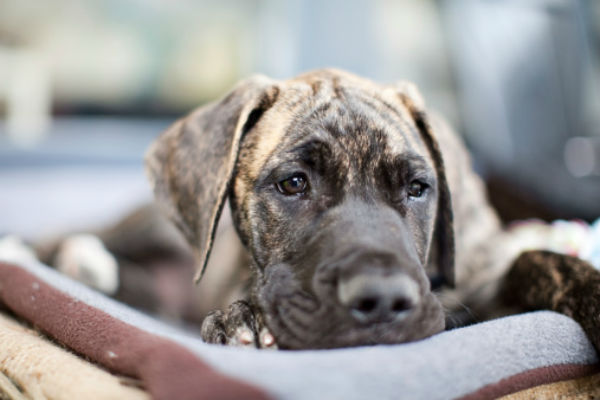Health Issues in Great Danes
These dogs with a big size and a warm heart do not have too long a life span because of the several health concerns they may be prone to. A Great Dane breeder from Chembur, Mumbai who I personally know had once said, “Their big size is a perfect contrast to their failing health”.

Hip dysplasia: Common in most big dogs, this condition may range from mild lameness to paralysis is its severest form.
Keep a check on your Dane’s diet if he is diagnosed with hip dysplasia as the ACVS (American College of Veterinary Surgeons” suggest that increased weight gain may aggravate the condition further.
DCM or Dilated Cardiomyopathy: The heart gets enlarged, with your dog likely to show symptoms such as weakness, coughing, disinterest in exercise, breathing difficulty and even death in extreme cases. Though males are likely to be at a greater risk of DCM than females, it is necessary to have your Great Dane checked by a vet cardiologist at least once in a year or even earlier if you notice any abnormalities in it.
Gastric torsion or bloating: A common occurrence in deep-chested canines, this condition might even prove fatal for your Great Dane. It causes swelling of the stomach, followed by twisting, which therefore refrains the dog from burping and vomiting. Blood supply to the stomach and even the spleen is cut off, resulting in shock and even death within a short span from its occurrence, if not addressed promptly.
Besides keeping a close watch on what your Dane is eating, you can also consider opting for stomach tacking or prophylactic gastropexy, where laparoscopic surgery is conducted to minimize the severity of bloating.
Wobbler syndrome: Also referred to as cervical vertebral instability, it affects the dog’s vertebral column, resulting in an unsteady gait, from which it has earned the name “Wobbler”. Since Danes grow at a very fast rate, the bones exert pressure upon the spinal cord, leading to weakness in their legs. It may either be congenital, occurring in adolescent dogs when their cervical vertebra is malformed or because of any traumatic injury. Early prognosis results in a speedy recovery, while most dogs needing a surgery to correct it.
Cancer: They mostly suffer from osteosarcoma (bone cancer) and lymphoma. If your dog has difficulty in walking, loss of appetite, fever, weight loss, vomiting, dark stool, increased urination or any other abnormal traits, speak to the vet at once. Research is being conducted to bring out new treatment options in combatting cancer.
Eye problems: The common eye conditions they may suffer from include glaucoma (even leading to blindness), entropion or ectropion (inward or outward rolling of the eyeballs), and cataracts (juvenile: six month old puppies, bilateral: older dogs). Get your dog’s eye checked on a regular basis to minimize these problems.
Tips to buy a healthy puppy
- Ask your breeder for the health screening report of the Great Dane puppy’s parents, to ensure that they were relatively healthy without incidences of bloating thyroid or bone cancer.
- Prefer buying puppies that are at least eight weeks old and ask the breeder about their vaccination.
- Go for those that have received vaccines from the vet and not the breeder himself.